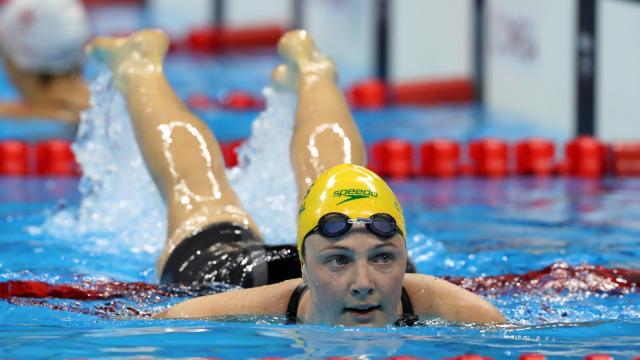Pools are giant toilets. Around one in five Americans admit to having peed in a swimming pools at least once. Every pool probably contains a shot glass full of urine per swimmer, according to a story by Chemical and Engineering News from last year.
She loves to swim in the big pee bath (Image: AP)
The people around you might not know you peed. But thanks to the artificial sweeteners you eat, science knows. Science always knows.
Sure, pee is sterile, but its chemicals can react with the pool water to form so-called “disinfectant byproducts”, or DBPs. Some of these chemicals can even be toxic, but that C&EN story reports that we don’t know if swimmers are exposed to enough DBP in pools to cause health effects. Regardless, it would be nice to know how much pee was in the pool so more people don’t pee in it. According to a recent study in Environmental Science and Technology Letters, the answer might be in the artificial sweeteners you eat.
[referenced url=”https://gizmodo.com.au/2016/08/the-real-reason-you-shouldnt-pee-in-the-pool/” thumb=”https://i.kinja-img.com/gawker-media/image/upload/t_ku-large/ps0ycug1oxeyf3wdsouw.jpg” title=”The Real Reason You Shouldn’t Pee In The Pool ” excerpt=”Video. Peeing in the public pool is gross, immature, but basically harmless, right? A quick fix when you’ve really gotta go? Not exactly. In advance of the its annual summer meeting, the American Chemical Society has just released a video explaining, in gory scientific detail, why peeing in the pool makes it a more unhealthy environment for everybody, you disgusting hairless flesh monster.”]
A team of researchers looked at one common sweetener in particular, called acesulfame-potassium, or Ace-K. People eat lots of Ace-K, because it shows up in diet soft drink, lollies, jelly and plenty of other products, wrote Bill Chameides, a Duke University professor emeritus. Even better, almost all the Ace-K you eat, 95 per cent of it, leaves the body in the urine, Xing-Fang Li, professor in the Department of Laboratory Medicine and Pathology at the University of Alberta told Gizmodo. Using it for the study “makes sense,” she said. “It’s representative of urine, and it’s not naturally occurring.”
The simple analysis Li and her team performed involved taking pool and hot tub samples and passing them through a high performance liquid chromatography-mass spectrometer system, one of the most common instruments for determining what chemicals are in a given thing. The bad news: One hundred per cent of the tested pools contained at least some Ace-K. Through some estimation, and by testing 20 Canadians’ urine samples, the researchers found 416,395L pools contained around 30L of urine on average, and 832,790L pools contained around 70L on average, Lindsay Blackstock, a University of Alberta graduate student and the study’s first author told Gizmodo.
That doesn’t mean you shouldn’t swim in the pool, though. “The benefits of keeping active through swimming outweigh the potential risks we use as rationale for the study,” said Blackstock. So, what does this mean for you? Li doesn’t want to shame anybody, but “this is really public education,” she said. “Just don’t do it, don’t pee in the pool!”
As far as peeing in oceans, that’s still fine. “The products excreted by humans are very similar to the products excreted by fish,” said Blackstock. “You’re sort of adding to the mix there so I wouldn’t be worried about that.”
